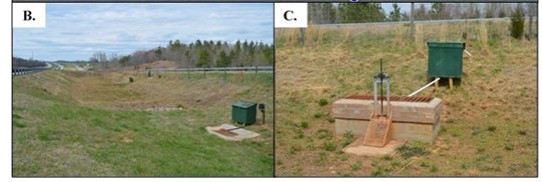While stormwater Control Measures (SCMs) are designed to treat runoff, their principal focus has been treating moderately sized rainstorms. How these SCMs fare during larger events and the restorative maintenance efforts associated with SCM damage is a significant concern for the North Carolina Department of Transportation (NCDOT).
This project created stormwater infrastructure models using the Personal Computer Storm Water Management Model (PCSWMM) software for four SCMs previously studied by NCDOT. Models for two bioretention cells (Mango Creek BRC and Wilmington BRC), a dry detention basin (DDB), and a regenerative stormwater conveyance (RSC) system were built, and simulations were run to determine the points of failure for each SCM.

DDB is long and narrow (B) with an outlet structure in the center (C)
Failure was defined as a significant berm breach, and different simulation storms were constructed using two storm distribution types and two storm depth determination methods. Additionally, each set of simulations was run on the as-built design of the SCM as well as a hypothetical retrofit that increased storage volume, resulting in a total of eight different sets of simulations. Storm distributions were created using a standard National Resources Conservation Service (NRCS) unit hydrograph as well as natural distributions observed during Hurricane Florence in 2018. Standard storm depths from National Oceanic and Atmospheric Association (NOAA) Atlas 14 precipitation frequency tables were used, as well as depths with the application of a regional scale factor, a factor that accounts for local variations in changing precipitation patterns. All simulations were run at industry-standard return period intervals (10, 25, 50, 100 years).
Failure points ranged from the 10-100yr storms. The DDB and RSC had the lowest risk of failure, likely due to their larger storage and conveyance capacities. While the different storm depths and distributions resulted in some performance differences, the retrofitting of the SCMs proved to be the most significant factor in determining failure.
This research supports maximizing available storage volumes to increase SCM resiliency to extreme events.
